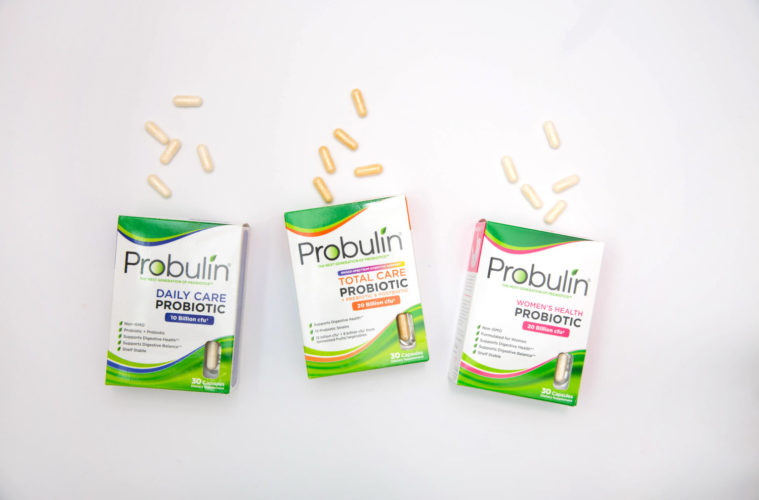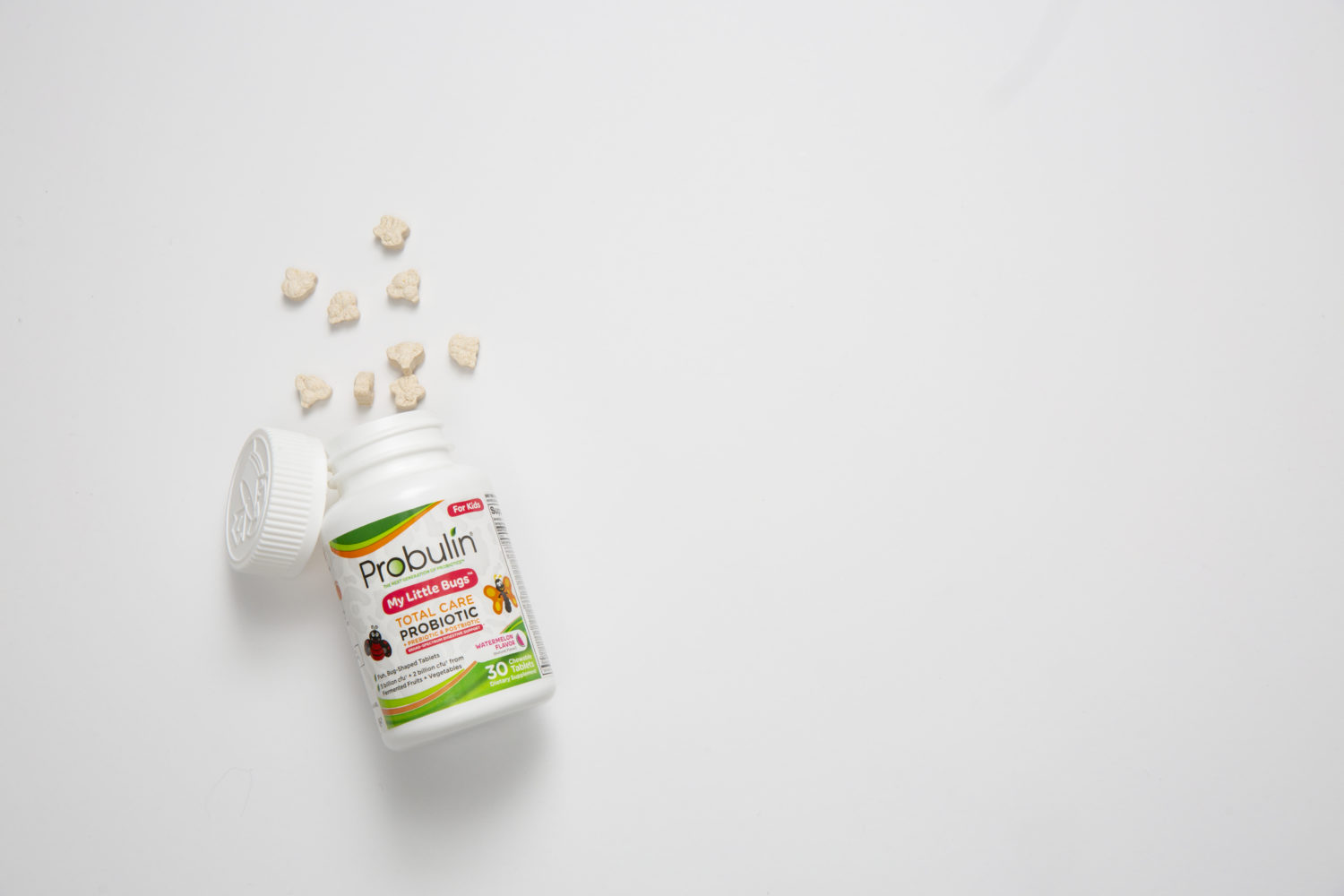The Reality: Your Kids Benefit from Balanced Microbiome But Food-Based Probiotics Can Be a Dicey Choice
Eating probiotic-rich foods is often recommended as a good way to get good bacteria into your gut and support your digestive and immune health. But, how practical is this advice for kids, who can be notoriously picky eaters? (Cheeseterians, we’re looking at you.)
Let’s face it, the benefits of probiotics for kids are many, but kefir, kombucha, kimchi, tempeh and sauerkraut can be a hard sell for many adults, much less children.
Probiotic yogurt for kids is probably the one probiotic food that is both palatable and popular with the young ones. But, today’s kid-styled yogurts are often a far cry from the ones consumed in the time of Ilya Ilyich Metchnikoff. Take a look at their labels. Along with any CFU count (some don’t even have these!), you’ll likely find an awful lot of sugars and additives, like food colorings and preservatives. These unfortunate ingredients, while improving taste and shelf life, do a real disservice to your kid’s gut microbiome and likely negate any good your child will get from the probiotics in the yogurt.
The Best Probiotics for Kids: What’s the Real Deal Behind these “Good” Bacteria?
Probiotics for adults, as well as probiotics for kids, have come a long way since getting recognized in the early 1900’s. Today they’re best known for supporting comfortable digestion and strong immune function, but these mighty microorganisms also play a vital role in the synthesis of many vitamins, enzymes, and acids. This is why so many adults today take probiotic supplements.
That’s all-good news, right? For adults, the benefits of probiotics seem more clear.
But, what about probiotics for kids? If you’re a parent or caretaker you’ve no doubt wondered at some point, ‘Should kids take probiotics?’ Or ‘Are probiotics safe for kids?’
Probiotics for Kids: What the Science Says
Fun fact about probiotics: They were first discovered when Nobel Prize winner and director of the Pasteur Institute, Ilya Ilyich Metchnikoff, noticed that poor people living in harsh, rural Bulgaria were staying healthier than their rich, urban counterparts.
He theorized that their hearty consumption of soured milk (also known as yogurt), and the healthy microbes it contained, was the reason why.
It turns out he wasn’t wrong!
Fast forward over one hundred years (and a lot of thorough research by dedicated microbiologists) and we have far more details about probiotics and how they work. We now know that:
- Probiotics are considered generally safe to take by all populations, including children
- Probiotics are an important part of the body’s gut microbiome—the flora or set of microbes living and working in the gastrointestinal tract.
- Of the trillions of bacteria that call the human body home, most reside in the gut. (And there are hundreds of different identified probiotic strains, even probiotics for women and probiotics for men.)
- Probiotics play a major role in immune function by keeping the gut lining healthy
- In order for the best probiotics for kids to be effective, they must survive the trip through harsh stomach acids and arrive alive in the gut, where they can colonize.
- Prebiotics are food sources for probiotics that help them survive in the gut, and products with both prebiotics and probiotics are known as “synbiotics.”
- And much more!
But how can one support this great mission for their children when most of the choices available to parents and care-takers in the grocery stores are low in high-quality probiotics strains and high in processed sugars? Let’s dive into what you need to know to make sure you’re choosing the best probiotics for your kids.
Choosing Probiotics for Your Kids
Now you have a nice handle on beneficial bacteria and probiotics for kids. But you still may be wondering how to buy the best probiotics for kids.
You’re not alone. One study noted that millennial parents tend to have greater interest in healthy product options for their kids, resulting in increased demand for kid-friendly health options like probiotics. (Who doesn’t want to set the stage for happy digestive health, especially after a round of antibiotics or when occasional tummy upset crops up?)
We’re going to break down the things you need to know, plus offer some solutions that might just help make things easier for the whole family.
The trouble with finding workable probiotic foods for kids has many parents turning to supplements instead. And this is exactly why we created My Little Bugs™ Total Care Probiotics for Kids!
Whether you choose Probulin’s awesome chewable probiotic for kids or another brand you trust, we want you to be armed with the best information out there.
Learn More about Probulin My Little Bugs Probiotics for Kids
When shopping for the best probiotics for kids, there are a handful of really important things to consider. Make sure the formula you pick meets these marks:
- Multiple probiotic strains, including the two most thoroughly researched—Lactobacillus and Bifidobacteria
- 5-10 billion CFUs, which is the daily amount recommended for kids by the American Family Physician
- Prebiotic and postbiotics included to feed and nurture the probiotics for max effectiveness
- Shelf stable, no refrigeration required so it’s easy for kids to take on the go (because they’re always on the go!)
- Third-party tested to ensure the labeled potency is really what your child is getting
My Little Bugs™ Total Care Probiotics for kids gives you all of this and more.
The probiotics are also protected by an advanced brown seaweed complex that shields them from destructive stomach acid so they make it to your kiddo’s gut alive and ready to take action.
Best of all, these probiotics come in fun bug-shaped chewable tablets with a delicious watermelon flavor that your child will love. When it comes to the probiotics (and parenting) game…My Little Bugs Probiotic formula is a homerun.
(And don’t worry about the warm summer temps! My Little Bugs Kids Probiotics are shipped in heat-safe packaging, too.)
Formulated to be one of the best probiotics for kids available, we’re excited for you to try this unique formula, which includes several broad-spectrum probiotic blends, including a unique fermentation blend from organic beets, kale, raspberries, blueberries, and figs.
You can read more about My Little Bugs formula here, or place an order to try them here. We’re excited for you to see how easy it is to make sure your kids get a daily probiotic for their little tummies.
Advertising disclosure: We may receive compensation for some of the links in our stories. Thank you for supporting LA Weekly and our advertisers.


